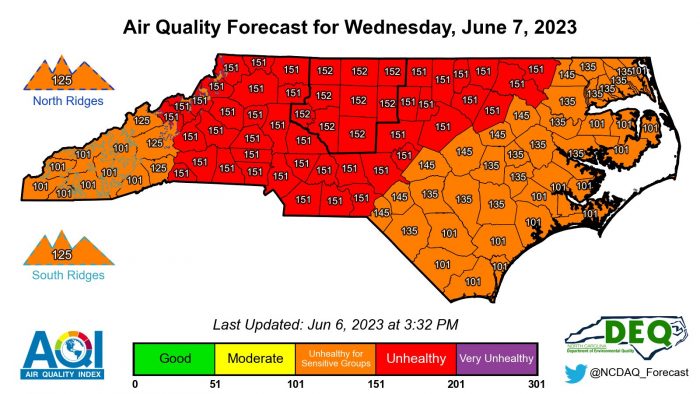
Due to rapidly rising levels of fine particle pollution attributed to smoke from active wildfires in Canada, all of North Carolina will be under a Code Red or Code Orange Air Quality Action Day on June 7.
The Code Red alert covers much of central North Carolina, including Charlotte, the Triangle and the Triad regions. Code Red on the Air Quality Index represents unhealthy air quality for everyone.
The rest of the state, including eastern and western regions, are forecasted to reach Code Orange levels tomorrow. Sensitive populations — including older adults, younger children and those with respiratory conditions such as asthma — may experience health impacts when outdoors for prolonged times.
The N.C. Department of Environmental Quality’s Division of Air Quality (DAQ) and the Forsyth County Environmental Assistance and Protection issued the air quality alerts to make the public aware of health impacts from significantly elevated fine particulate matter, or PM2.5, levels.
Smoke and accompanying high levels of PM2.5 started to be carried downwind from Canada into North Carolina on Tuesday. As the smoke continues to build into the state, high levels of fine particles are expected to mix near ground level.
PM2.5 is comprised of particles smaller than the width of a human hair. These particles can reach deep in the lungs and aggravate asthma and other lung conditions and have been linked to heart conditions.
DAQ monitors and forecasts ozone and PM2.5 daily using the Air Quality Index (AQI), along with the corresponding AQI color codes to help North Carolinians plan their outdoor activities. Next-day and extended products are issued by 3 p.m. with a morning update by 10 a.m.
Code Red on the AQI represents unhealthy air quality for everyone. If you are in an area forecasted to reach Code Red tomorrow, consider limiting prolonged or heavy exertion outdoors. Anyone sensitive to air pollution, including people with asthma, should avoid outdoor exertion altogether.
In areas forecasted to be Code Orange, people sensitive to air pollution should reduce their time outdoors.
For the latest air quality information, visit the Air Quality Portal online. DEQ’s website has a list of resources for keeping safe around wildfire smoke.









